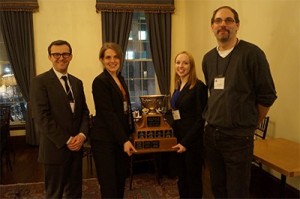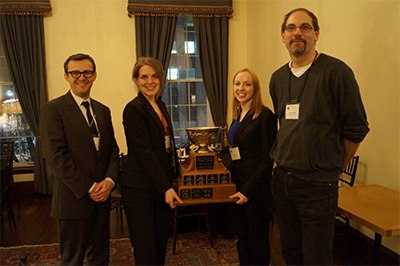Arnup Cup (Ontario Trial Advocacy Competition) and the Sopinka Cup (National Trial Advocacy Competition)

Team Members: Ryann Atkins, Anna Cooper
Coaches: Rob Centa (Pallier Roland), Jonathan Shime (Cooper, Sandler, Shime & Bergman)
Problem: A criminal case involving child abduction. While drunk, an adoptive mother left the child outside a bar in the middle of winter, and he developed hypothermia. At that moment, the child was abducted by his biological mother.
Results: Ryann & Anna won the Arnup cup. That victory sent them to the national trial advocacy competition, the Sopinka Cup, which was won by Dalhousie.
Bowman Tax Moot
Team members: Christie Campbell, Peter Flynn, Liam Oster, Bhuvana Sankaranarayanan
Coaches: Sameer Hurmohamed, Leo Elias, Amanda Heale (Osler), Martha McDonald (Osler).
Problem: Are two brothers who buy thousands of lottery tickets sufficiently organized to constitute a business? The brothers had made more than $5 million over four years, and claimed that their winnings were tax exempt. The Crown argued that their system was a business, and that their profits ought be taxed.
Result: Peter & Christie won best respondent factum, and Liam & Bhuvana made the semi-finals. U of T was the only team to both make it to semi-finals and win a factum award.
Cassels Brock Cup (“Baby Gale”)
Team members: Bailey Rudnick, Anthony Mouchantaf, Danny Urquhart, Matt Morley, Aron Katz, Alex Penny, Matt Budd, Christophe Shammas, Joe McGrade, Kathleen Elhatton-Lake, Dave Kumagi, Alex Condon, Marita Zouravlioff, Ethan Schiff, Chris Yeretsian, Elaine Sun, Aoife Quinn, Leah Sherrif, Kaitlin Owens, Chad Pilkington.
Coaches: Anu Koshal, Steve Aylward, Louis Tsilivis, Meghan Bridges, Lane Krainyk
Problem: The Cassels Brock Cup uses the same problem as the Gale Cup. The case concerned a young woman with mental disabilities who had allegedly been sexually assaulted. Under 16(3) of the Canada Evidence Act, a witness whose capacity to testify has been challenged must be able to “promise to tell the truth”. The issue was whether this included an implicit requirement that the witness demonstrate an understanding of the meaning of a promise.
Results: Kaitlin Owens won the second place speaker award. However, Osgoode won the cup this year, the first time either school has won two years in a row.
Corporate Securities Moot
Team members: Jordan Katz, Hani Migally, Michael Warfe, Aaron Sanfilippo
Coaches: Michael Portner Gartke, Paul Davis, Andrew Matheson (McCarthy’s)
Problem: A hostile takeover bid scenario where the bidder is in litigation against the target board. The moot focused on whether the directors’ defensive tactics breached their fiduciary duties, the validity of the specific defensive tactics in question (a “poison pill”, and issuing equity to dilute the bidders’ share), and whether the bidder and another shareholder were acting jointly.
Result: U of T won the final round against the University of Calgary, before the panel of Blair J. (OCA), Armstrong J. (OCA), James Farley, who was the supervising judge of the Commercial List from its inception in 1991 to 2006, OSC Chair Howard Wetston, and OSC Vice-Chair James Turner.
Canadian Labour Arbitration Competition
Team members: Allyson Lee and Leora Jackson
Coaches: Akosua Matthews, Andrew Max, Laura Trachuk
Problem: The moot concerned whether an employer is entitled to search an employee’s locker and whether the results of that search on a particular case justified termination. In the fact pattern, a security guard working at a mall with a ban on firearms fell asleep on the job and then later brought a rifle to work in anticipation of a hunting trip (the setting was Manitoba). The rifle was discovered in the guard’s workplace locker and he was terminated.
Result: U of T made it to the final round, but were narrowly defeated, finishing in second place overall.
Frank W. Callaghan Memorial Moot
Team Members: Ben Elzinga-Cheng, Chris Evans, Jennifer Bernardo, Annie Tayyab, Khrystina McMillan, Nick Rolfe, Maya Ollek, Laura Cardiff, Hanna Cho, Anna Chen, Cate Simpson, Pravin Thomas, David Morawetz, Vlad Calina, Aria Laskin, Jessica Elders
Coaches: Eva Tache-Green, Ryann Atkins, Arina Joanisse, Jakub Vodsedalek, Hannah Freeman, Jonathan Tam, Anu Koshal
Problem: The case focused on a young lawyer who ran an illicit drug sales business. Her work laptop, owned by the firm, held evidence of her crimes. The case focused on whether she had a reasonable expectation of privacy in the laptop, and if so, whether a search of the laptop was unconstitutional.
Results: Laura Cardiff and Maya Ollek won the competition, defeating Khrystina McMillan and Nick Rolfe in the final round.
Best Appellant’s factum: Khrystina McMillan and Nick Rolfe
Best Respondent’s Factum: Jen Bernardo and Annie Tayyab
1st place oralist: Vlad Calina
2nd place oralist: Laura Cardiff
3rd place oralist: Maya Ollek
The Gale Cup Moot
Team Members: Steven Aylward, Meghan Bridges, Anu Koshal, Louis Tsilivis
Coaches: Michael Dineen, Karen Bellinger, Christine Wadsworth, Richard Lizius, Josh Stark
Problem: the case concerned a young woman with mental disabilities who had allegedly been sexually assaulted. Under 16(3) of the Canada Evidence Act, a witness whose capacity to testify has been challenged must be able to “promise to tell the truth”. The issue was whether this included an implicit requirement that the witness demonstrate an understanding of the meaning of a promise.
Results: The U of T team did not make it to the final round.
Harold G Fox Intellectual Property Moot
Team Members: Kiran Arora, Alexis Glazer-Beale, Abbas Kassam, Kevin Siu
Coaches: Chris Langan, Andy Shaugnessy, Peter Wilcox
Problem: This year’s problem dealt with copyright. The question was whether editing a film down to a song specific segment was an infringement of the song itself.
Results: Kiran and Kevin made it to the final round, but were defeated by Osgoode. Kevin received the awards for top 2L oralist & top oralist overall. U of T’s performance in the Fox moot grants the school free entry into the Oxford IP Moot.
Julius Alexander Isaac Diversity Moot
Team Members: Jonathan Chan, Noemi Chanda, Joan Kasozi, Brandon Walker
Coaches: Arleen Huggins (Koskie Minsky) and Prof. Simon Stern
Problem: The moot focused on the adoption of a child of Mi’kmaq/African-Canadian heritage. The issue was to determine the best interests of this child, and the relative importance of the race of the adoptive parents.
Results: Jonathan and Noemi won the moot, as well as the top respondent factum, and Jonathan won the prize for top oralist.
Kawaskimhon Talking Circle Moot
Team Members: Emilie Lahaie, Aislin Stott, Rebecca Sutton (representing in Odawa Business Development Corporation, an Aboriginal run Business development group)
Coaches: Douglas Sanderson, Kate Kempton (OKT Law)
Problem: A number of interested groups were asked to come together to discuss the possible adoption of a proposal to permit First Nations to designate portions of their reserves as fee simple lands. Two main issues were on the agenda. First, whether it would appropriate to empower First Nations to designate portions of their reserves as fee simple lands. Second, how this might be accomplished, within the context of applicable Canadian and First Nation jurisdictions and taking into account the economic and other interests and values of affected parties.
Result: The Kawaskimhon Moot is structured to be a talking circle in which teams represent various interested parties to exchange views and explore whether consensus can be reached. There are no awards given out. However, in the words of their coach, Prof, Sanderson, the team this year “mastered difficult material, then twisted that knowledge to redeploy it in ways that surprised and delighted me. [They] were diplomats, hard ass negotiators, friends, frenemies and partners around the negotiation table.”
Laskin Moot Court Competition
Team members: Liam Churchill, Max Laskin, Penny Garnsworthy, Ljiljana Stanic
Coaches: Sylvie Rougerie, Nadia Sayed, Sarah Corman, William McLarkey
Problem: An appeal involving re-litigation of a human rights issue that had already been decided by a labour arbitrator.
Results: U of T received the third place prize for their factum, and finished as the fourth place team overall.
Phillip C. Jessup International Law Moot Court Competition
Team Members: Alice Tsier, Danielle Glatt, Ashvin Singh, Robin McNamara
Coaches: Anisah Hassan, Sarah Yun, Lane Krainyk, Elizabeth Bingham
Problem: the case centered on a fictitious country, Alfurna, which was suffering from flooding caused by climate change. The moot focused on four issues – whether Alfurna constituted a state, the legal status of migrants escaping the country by boats, the appropriate treatment of those migrants, and the status of Alfurna’s financial assets.
Results: U of T did not make it to the final round this year.
Willms Shier Environmental Law Moot
Team Members: Paul Mitassov, Sarah Elcombe, Sean Tyler
Coaches: Lee Webb, Travis Allan, Laura Zizzo
Problem: the moot was based on a fictitious appeal of Smith v. Inco Ltd. Inco’s nickel refinery deposited thousands of tons of nickel onto the properties of Port Colborne, resulting in lower property values but no clear health effects. The issues were whether such deposits could fall under private nuisance or the tort in Rylands v. Fletcher. Mooters were also asked to come up with novel causes of action that could provide remedies to the residents of Port Colborne.
Result: U of T did not make it to the final round this year.
Wilson Moot
Team members: Adam Sproat, Thomas Wagner, Haran Viswanathan, Lara Guest
Coaches: Hayley Peglar, Jeremy Nemers, Lorraine Weinrib, Cheryl Milne
Problem: A Charter challenge to hypothetical legislation allowing physician assisted suicide for individuals with terminal illnesses. The appellant, who suffers from schizophrenia, had repeatedly expressed his wish to die before lapsing into a psychotic state. His litigation guardian challenged the legislation on the grounds that it discriminates against the appellant under section 15 of the Charter and violates his rights to life, liberty, and security of the person under section 7.
Results: U of T won first place factum and second place team overall. Lara Guest won the prize for first place oralist. Adam & Thomas represented U of T in the final round, before Cromwell J. (SCC), Saunders J. (BCCA), and Sharpe J. (OCA).






